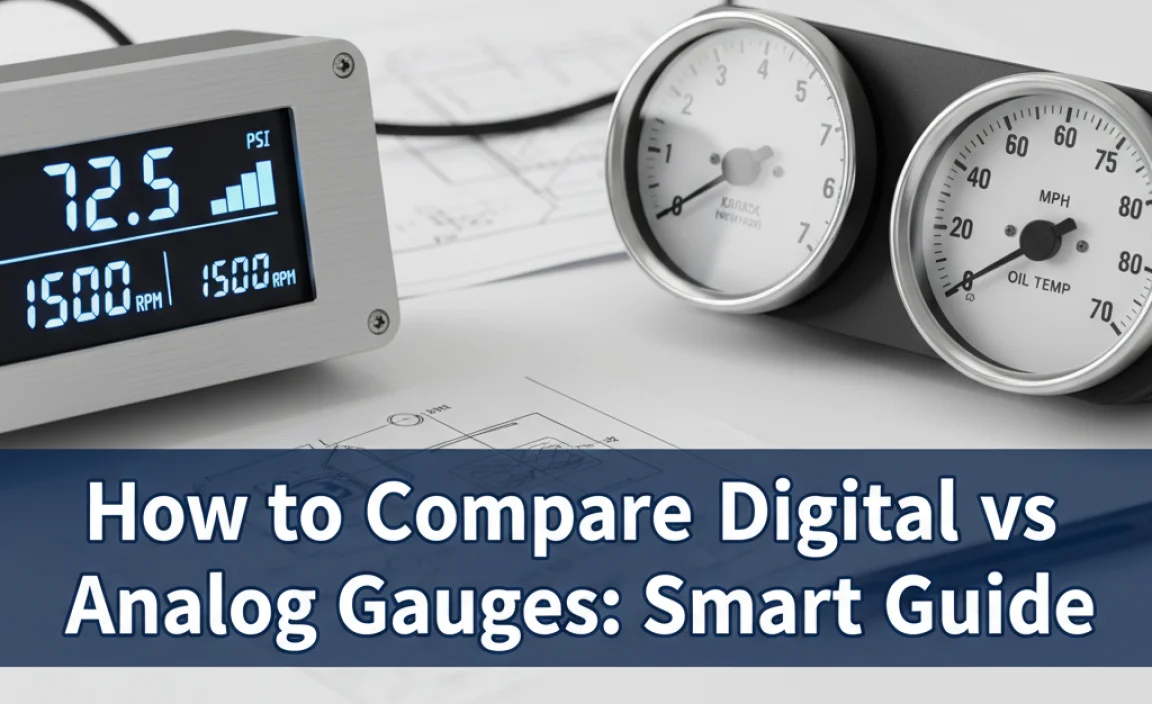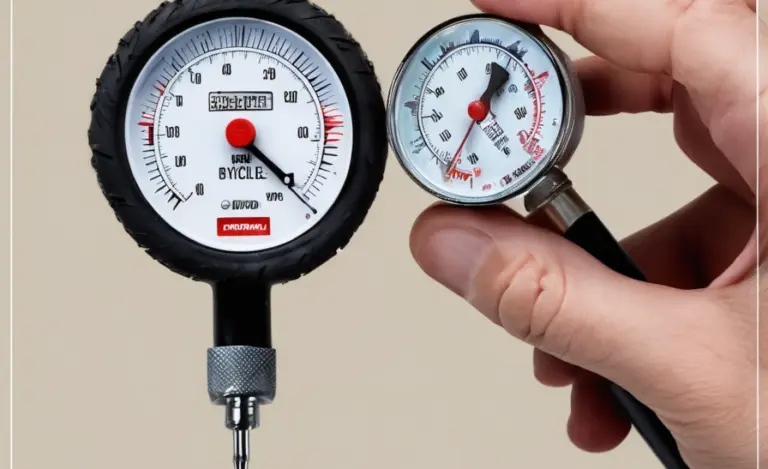How to Compare Digital vs Analog Gauges: Smart Guide
Do you know what a gauge is? Gauges help us measure things. They can show speed, pressure, or temperature. Some gauges have needles that move. Others have numbers that light up. Today, we will learn *how to compare digital vs analog gauges*.
Have you ever seen a car dashboard? It has many gauges. Some cars have old-style gauges. Other cars have new, digital gauges. Which ones are better? Let’s find out!
Key Takeaways
- Understanding *how to compare digital vs analog gauges* helps choose the right one.
- Analog gauges show changes with a needle, offering a quick visual read.
- Digital gauges display exact numbers, providing precise measurements clearly.
- Consider accuracy, readability, and where you will use the gauge.
- Both types have strengths; the best choice depends on the job.
Understanding Analog Gauges
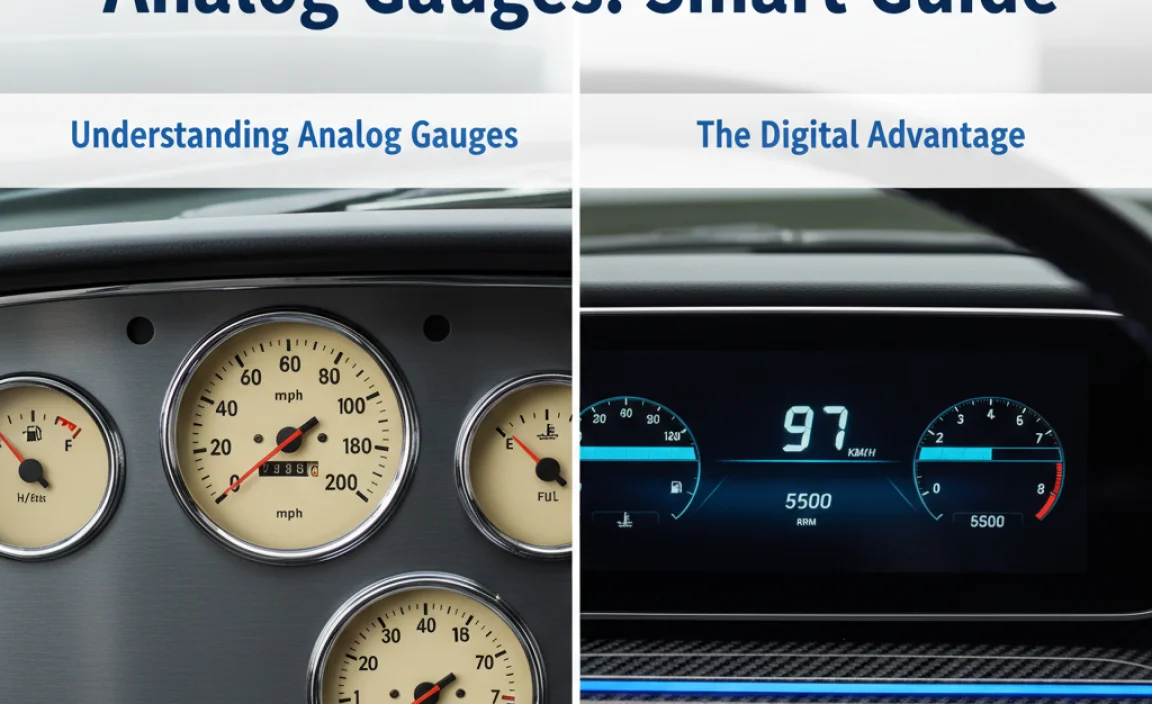
Analog gauges are like the clocks with hands. They use a needle to point at a number. This shows you the measurement. Think about a speedometer in an older car. The needle moves as you drive faster. Analog gauges are easy to read at a glance. You can see changes quickly. They don’t need power to work. This makes them useful in many places. They are often cheaper than digital gauges. Many people like the classic look of analog gauges. But, they might not be as accurate as digital ones. It can be hard to read the exact number. The needle might be between two numbers. Still, they’re simple and reliable. They are a great option for many uses.
- Analog gauges use a needle to show measurements.
- They are easy to read quickly.
- These gauges don’t need electricity.
- Analog gauges are often less expensive.
- They have a classic and simple look.
Analog gauges have been around for a long time. They are used in many different ways. You can find them in cars, boats, and airplanes. They also measure pressure in tanks. They are used for temperature in ovens. The simple design makes them easy to fix. Most people can understand *how analog gauges* work. This makes them a popular choice. They are a simple and reliable solution. Even with newer technology, they still have a place. They are a good choice when you need a quick and easy reading. They will continue to be used for many years.
How Do Analog Gauges Work?
Have you ever wondered *how analog gauges* actually work? Inside, there are gears and springs. These parts move the needle. When pressure or temperature changes, it pushes on these parts. This makes the needle move. The needle points to a number on the gauge. The number shows the measurement. It is a simple but clever design. The parts work together smoothly. This gives you a quick and easy reading. Do you think you could build one?
Advantages of Analog Gauges
What makes analog gauges so good? They are easy to read at a glance. You can quickly see the measurement. They don’t need batteries or power. This makes them reliable in any situation. They are often cheaper than digital gauges. Many people like the way they look. These gauges are tough and can last a long time. They are also easy to understand and fix. This means they are a good choice for many jobs. They are simple, reliable, and easy to use.
Where Are Analog Gauges Used?
Analog gauges are used in many places. You can find them in cars and trucks. They show the speed and fuel level. They are also in older machines. They measure pressure and temperature. Some homes have analog thermometers. These gauges are useful in places without power. They are also good for simple measurements. They are a reliable tool in many different situations. They are used everywhere.
Fun Fact or Stat: The first pressure gauge was invented in the 1840s and was an analog gauge!
Exploring Digital Gauges
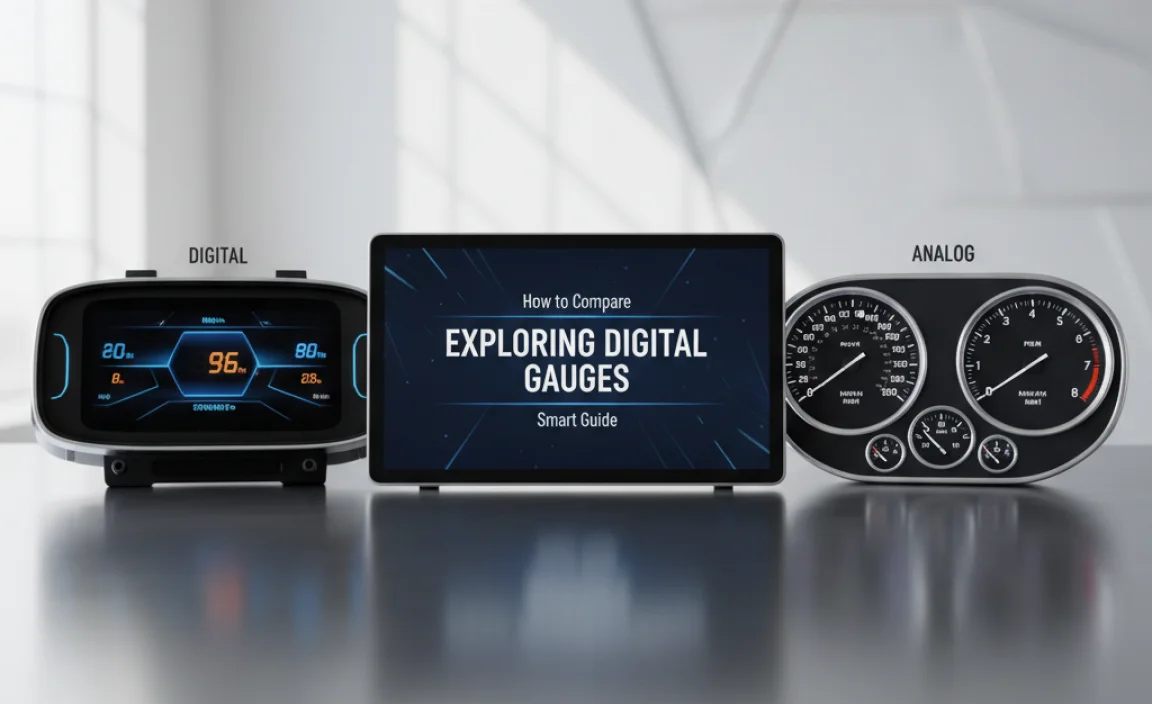
Digital gauges are like the clocks with numbers. They show the exact measurement on a screen. They use electricity to work. Think about a scale that shows your weight. It displays the number clearly. Digital gauges are very accurate. They can show small changes in measurement. They are easy to read in low light. Some digital gauges can store data. This is helpful for keeping track of information. They might cost more than analog gauges. But, they offer many features. Digital gauges are great for precise measurements. They give you a clear and accurate reading. They are a great choice for many uses.
- Digital gauges show measurements on a screen.
- They use electricity to operate.
- These gauges are very accurate.
- They can store and display data.
- Digital gauges are easy to read in the dark.
Digital gauges use electronic sensors to measure things. These sensors send information to a computer chip. The chip shows the measurement on the screen. This process is very accurate. They are often used in science and industry. Digital gauges are helpful for complex tasks. They can connect to computers. They can also send data to other devices. This makes them useful for monitoring things remotely. They are a high-tech solution for measuring. They offer many features that analog gauges do not. They are constantly getting better. They can handle more complex jobs. The future of measurement is digital.
How Do Digital Gauges Work?
Do you want to know *how digital gauges* work? They use sensors to detect changes. The sensors send signals to a computer chip. The chip turns the signal into a number. This number shows on the display screen. It is like a tiny computer inside the gauge. The computer does all the work. It makes sure the reading is accurate. Isn’t that amazing?
Advantages of Digital Gauges
What makes digital gauges so special? They are very accurate and precise. You get an exact reading every time. They are easy to read in any light. The numbers are clear and bright. Some gauges can store data for later use. They can connect to computers and other devices. Digital gauges offer many advanced features. They are perfect for tasks that need high accuracy. They are a great choice for modern technology.
Where Are Digital Gauges Used?
Digital gauges are used in many modern devices. They are in digital scales and thermometers. You can find them in medical equipment. They are also used in car dashboards. They are great for showing precise information. Many industries use digital gauges for testing. They help make sure things are accurate. They are found everywhere we need precise data. They are a key part of modern technology.
Fun Fact or Stat: Digital gauges can have an accuracy of up to 0.1%, making them super precise!
Accuracy: Digital vs. Analog
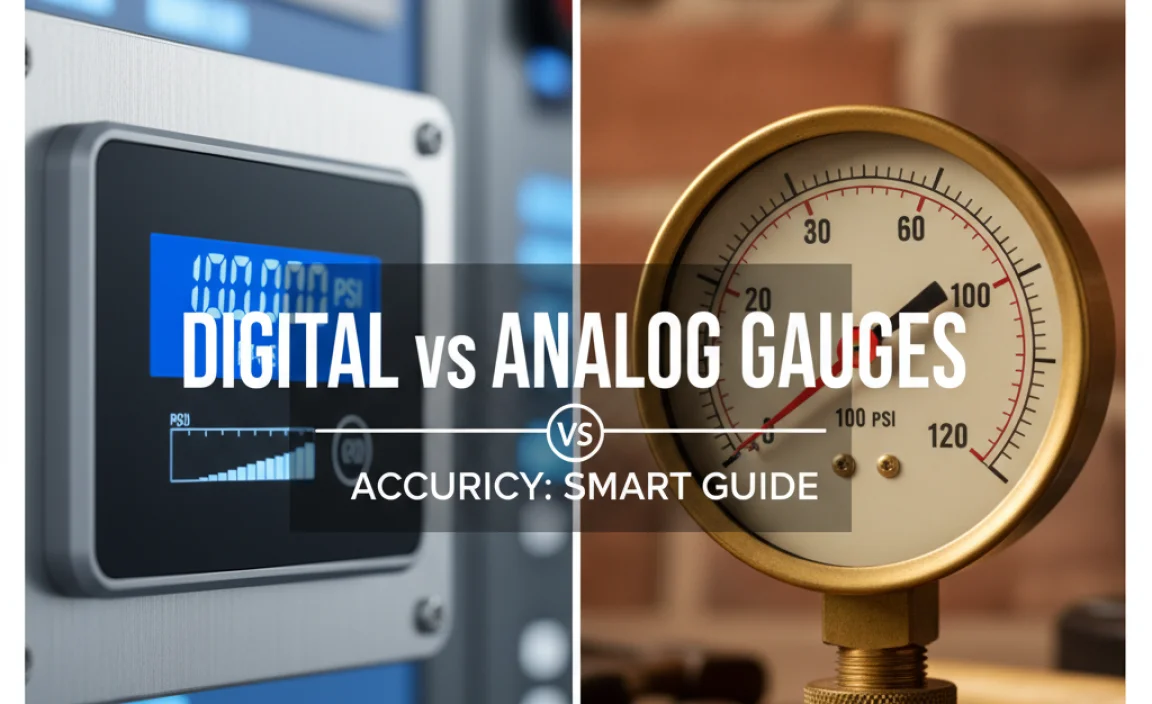
When thinking about *how to compare digital vs analog gauges*, accuracy is key. Digital gauges are usually more accurate than analog ones. They show the exact number. Analog gauges can be harder to read precisely. The needle might be between numbers. Small errors can happen when reading the gauge. Digital gauges use electronic sensors. These sensors give very accurate readings. If you need precise measurements, digital is better. But, analog gauges are still good enough for many uses. The level of accuracy you need will decide.
- Digital gauges often provide more accurate readings.
- Analog gauges can be harder to read precisely.
- Digital gauges use electronic sensors for accuracy.
- Analog gauges can have small reading errors.
- Consider accuracy needs when choosing a gauge.
Accuracy is very important in many fields. Scientists and engineers need precise measurements. They often use digital gauges for their work. In some cases, even small errors can matter. For example, in medicine, the right dose is very important. Digital gauges help doctors give the correct amount. But, for everyday uses, analog gauges are fine. They are good enough for measuring things like temperature in a room. The *choice between digital and analog* depends on how accurate you need to be. If accuracy is critical, digital is the best choice. If not, analog gauges can save money and still work well.
Why Is Accuracy Important?
Why do we need accurate measurements? Accurate measurements help us make good decisions. They help us build things correctly. They help us stay safe. Imagine building a bridge. You need to measure everything carefully. If the measurements are wrong, the bridge could fall. Accuracy is important in many parts of life. It is important at home, at school, and at work. Without accurate measurements, things can go wrong. So, always try to be as accurate as possible!
How Do We Measure Accuracy?
How can we tell if a gauge is accurate? We can compare it to a known standard. A standard is a very accurate measurement. For example, we can use a special weight to test a scale. We can use a precise thermometer to test a temperature gauge. If the gauge shows the same measurement as the standard, it is accurate. If it shows a different measurement, it is not accurate. Testing gauges helps us make sure they are working correctly. This helps us get accurate readings.
What Affects Gauge Accuracy?
What can make a gauge less accurate? Sometimes, the gauge is old or damaged. The parts inside might be worn out. This can make the readings wrong. Temperature can also affect accuracy. Some gauges work better in certain temperatures. It is important to take care of gauges. Clean them regularly and store them properly. This will help them stay accurate for a long time. Always check your gauges to make sure they are still working correctly.
Fun Fact or Stat: The most accurate gauges are used by NASA to measure things in space!
Readability: Which Is Easier to Read?
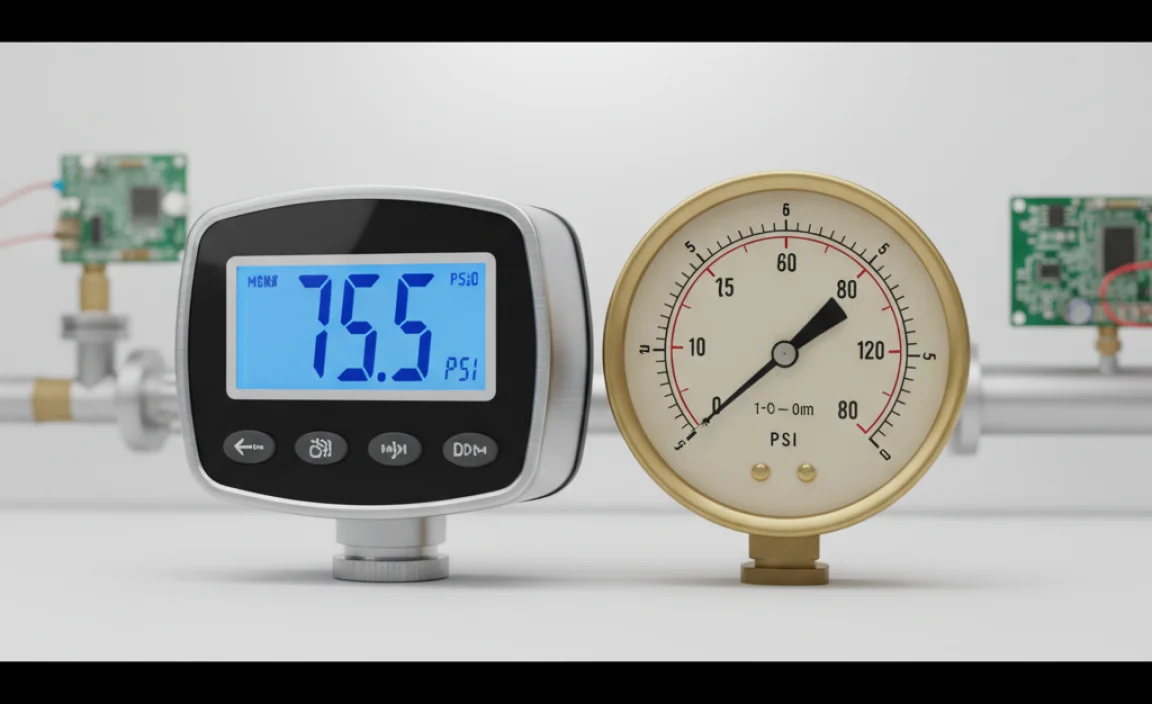
Readability is another thing to think about. This is *how to compare digital vs analog gauges*. Analog gauges are easy to read at a glance. You can see the needle moving. This helps you understand changes quickly. Digital gauges show the exact number. This can be easier for some people to read. But, you have to focus on the numbers. In low light, digital gauges are often better. They have a screen that lights up. Analog gauges can be harder to see in the dark. The best choice depends on what you like. It also depends on where you will use the gauge.
- Analog gauges are easy to read at a glance.
- Digital gauges show the exact number clearly.
- Digital gauges are easier to read in low light.
- Analog gauges show changes quickly with the needle.
- Consider lighting and personal preference.
Some people find analog gauges easier to understand. They like seeing the needle move. This helps them see *how the measurement* is changing. Other people prefer digital gauges. They like the clear, exact number. Digital gauges can also show more information. They might show the minimum and maximum values. They can also show the date and time. This can be helpful for keeping track of data. Both types of gauges have their advantages. The best choice depends on what is important to you. Think about what you need the gauge for. This will help you decide which one is easier to read for you.
What Makes a Gauge Easy to Read?
What makes a gauge easy to read? The size of the numbers is important. Big numbers are easier to see. The brightness of the screen matters too. A bright screen is easier to read in sunlight. The contrast between the numbers and the background helps. High contrast makes the numbers stand out. The angle of the gauge also affects readability. You want to be able to see it easily from where you are. All these things make a gauge easy to read.
Reading Analog Gauges
How do you read an analog gauge? Look at the needle. See where it is pointing. The needle points to a number. That is the measurement. Sometimes, the needle is between two numbers. You have to guess the value. This is why analog gauges are not always as accurate. But, with practice, you can get better at reading them. Just take your time and look carefully. You will become an expert at reading analog gauges.
Reading Digital Gauges
How do you read a digital gauge? Look at the screen. The screen shows the measurement. The number is clear and easy to see. Some digital gauges have extra features. They might show units of measurement. They might show the date and time. They can also show other information. Just read the screen carefully. You will get all the information you need. Digital gauges are easy to read.
Fun Fact or Stat: Some pilots prefer analog gauges in airplanes because they can quickly see changes!
Cost: Digital vs. Analog
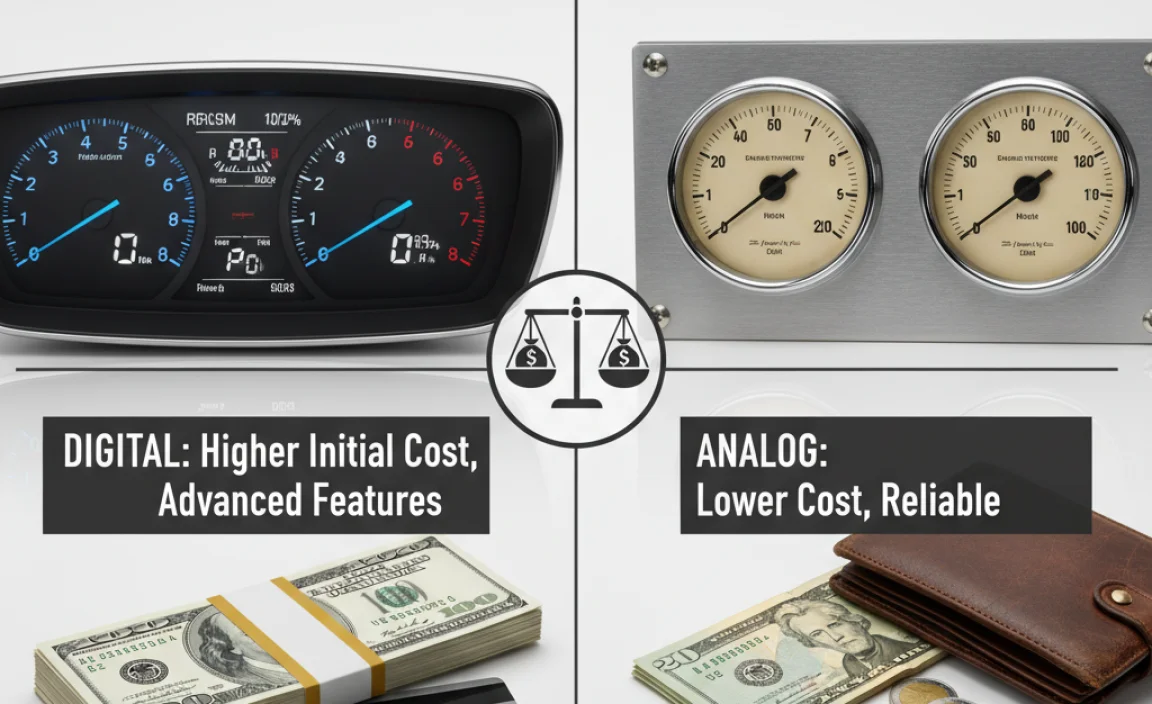
Cost is an important thing to consider. It affects *how to compare digital vs analog gauges*. Analog gauges are usually cheaper than digital ones. They have simpler designs. They don’t need as many parts. Digital gauges have electronic components. These parts can cost more. But, digital gauges might offer more features. They can store data and connect to computers. These features can be worth the extra cost. Think about your budget and what you need. This will help you decide which type of gauge is the best choice.
- Analog gauges are typically less expensive.
- Digital gauges often cost more upfront.
- Digital gauges may offer more features.
- Consider your budget when choosing a gauge.
- Think about the long-term value.
When you buy a gauge, think about the long-term cost. An analog gauge might be cheaper at first. But, it might not last as long. A digital gauge might cost more upfront. But, it could be more durable. It might also be more accurate over time. Consider the cost of replacing the gauge. Also, think about the cost of errors. If an inaccurate gauge leads to mistakes, it can cost you money. The best choice depends on your specific needs. It also depends on *how often* you will use the gauge. For simple tasks, an analog gauge might be fine. For critical tasks, a digital gauge might be worth the extra cost.
What Makes Gauges Cost More?
What makes one gauge cost more than another? The materials used to build it affect the price. High-quality materials can cost more. The complexity of the design matters too. A simple design is cheaper to make. A complex design costs more. The features also affect the price. More features mean a higher price. The brand of the gauge can also make a difference. Well-known brands often cost more. This is because they have a reputation for quality.
Finding Affordable Gauges
How can you find a gauge that fits your budget? Shop around and compare prices. Look at different stores and websites. Read reviews to see what other people think. Consider buying a used gauge. Used gauges can be much cheaper. But, make sure they are still in good condition. Ask if you can test the gauge before you buy it. This will help you make sure it is accurate. Be smart and do your research. You can find a great gauge at a good price.
When Is It Worth Spending More?
When should you spend more money on a gauge? If accuracy is important, spend more. If you need the gauge to last a long time, spend more. If you need special features, spend more. Think about *how often* you will use the gauge. If you use it every day, it is worth spending more. If you only use it once in a while, you can save money. Think about your needs and your budget. This will help you decide when to spend more.
Fun Fact or Stat: Some high-end digital gauges can cost as much as a small car!
Durability and Maintenance
Think about durability and maintenance. This is *how to compare digital vs analog gauges*. Analog gauges are often more durable. They have fewer parts that can break. Digital gauges have electronic parts. These parts can be sensitive to heat and shock. Analog gauges don’t need batteries. This means they will work even without power. Digital gauges need batteries or a power source. Analog gauges are easier to fix. You can often replace a broken part. Digital gauges might need to be replaced completely. Consider *how long* you need the gauge to last. This will help you decide which type is better.
- Analog gauges are generally more durable.
- Digital gauges have sensitive electronic parts.
- Analog gauges don’t need batteries to operate.
- Analog gauges are easier to repair.
- Consider the environment where it is used.
The environment where you use the gauge matters. If you use it in a tough place, choose a durable gauge. Analog gauges are good for harsh conditions. They can handle heat, cold, and vibrations. Digital gauges are better for controlled environments. They need to be protected from damage. Think about *how you will use* the gauge. This will help you choose the right one. Regular maintenance can help your gauge last longer. Clean it regularly and store it properly. This will keep it working well for many years. Proper care will extend the life of either type of gauge.
Taking Care of Analog Gauges
How do you take care of an analog gauge? Clean it regularly with a soft cloth. Keep it away from water and dust. Store it in a safe place. Protect it from bumps and drops. Check the needle to make sure it moves freely. If the needle sticks, get it fixed. Regular care will keep your analog gauge working well. It will last for many years. A little care goes a long way.
Taking Care of Digital Gauges
How do you take care of a digital gauge? Clean the screen with a soft cloth. Don’t use water or chemicals. Keep it away from extreme temperatures. Protect it from shocks and vibrations. Change the batteries when they are low. Store it in a safe place. Follow the instructions in the manual. This will help your digital gauge last longer. It will also keep it accurate.
Choosing a Durable Gauge
How do you choose a durable gauge? Look for gauges made from strong materials. Metal cases are better than plastic. Check the gauge for seals and gaskets. These protect it from water and dust. Read reviews to see what other people think. Ask the seller about the warranty. A good warranty means the gauge is well-made. Choose a gauge that is built to last. It will save you money in the long run.
Fun Fact or Stat: Some analog gauges from the early 1900s are still working perfectly today!
Best Uses for Each Type
Let’s consider the best uses. This is *how to compare digital vs analog gauges*. Analog gauges are good for quick readings. They are also good for places without power. Use them in cars, boats, and older machines. Digital gauges are best for accurate measurements. They are good for science, medicine, and industry. Use them when you need precise data. The best choice depends on the job. Think about what you need to measure. This will help you decide which gauge is best.
- Analog gauges are great for quick visual readings.
- Digital gauges excel in accurate data measurement.
- Analog gauges work well without electricity.
- Digital gauges are ideal for scientific applications.
- Choose based on the task and environment.
Think about *where you will use* the gauge. If you need a gauge for your car, an analog gauge might be fine. It will show you the speed and fuel level. If you need a gauge for a science experiment, choose a digital gauge. It will give you the accurate measurements you need. For simple tasks, analog gauges are often good enough. For complex tasks, digital gauges are better. Consider the specific requirements. This will help you choose the right type of gauge. Both types of gauges have their place. Choosing the right one will make your job easier.
Analog Gauges in Vehicles
Where are analog gauges used in vehicles? They show speed, fuel level, and engine temperature. These gauges are easy to read at a glance. Drivers can quickly see the information they need. Analog gauges are reliable and don’t need much power. They are a good choice for older cars and trucks. They are simple, reliable, and easy to understand. Many drivers prefer the classic look of analog gauges. They are a familiar part of the driving experience.
Digital Gauges in Science Labs
Why are digital gauges used in science labs? They provide accurate measurements. Scientists need precise data for their experiments. Digital gauges can measure small changes. They can also store data for later use. They are a valuable tool for scientific research. Digital gauges help scientists make discoveries. They are a key part of modern science. They help us understand the world around us.
Choosing the Right Gauge for the Job
How do you choose the right gauge for the job? Think about the accuracy you need. Think about the environment where you will use it. Consider your budget and your personal preference. Ask yourself what is important for the task. Do you need quick readings? Do you need precise data? Do you need a gauge that is durable? Answering these questions will help you decide. You can choose the perfect gauge for the job. This will make your work easier and more accurate.
Fun Fact or Stat: Some racing cars use both analog and digital gauges to give drivers the best information!
| Feature | Analog Gauge | Digital Gauge |
|---|---|---|
| Accuracy | Lower accuracy | Higher accuracy |
| Readability | Quick visual read | Precise number display |
| Cost | Lower cost | Higher cost |
| Durability | More durable | Less durable |
| Power | No power needed | Needs power |
Summary
In summary, knowing *how to compare digital vs analog gauges* involves looking at accuracy, readability, cost, and durability. Analog gauges are simple, durable, and easy to read at a glance. They don’t need power and are often cheaper. Digital gauges are more accurate, easy to read in low light, and can store data. However, they need power and can be more expensive. Consider *how you will use* the gauge. Think about the environment and your budget. This will help you choose the best gauge for the job. Both types of gauges have their advantages. The right choice depends on your specific needs.
Conclusion
Choosing between digital and analog gauges depends on what you need. Analog gauges are good for simple tasks. Digital gauges are better for accurate measurements. Think about accuracy, readability, cost, and durability. Consider *how you will use* the gauge. This will help you make the best choice. Now you know *how to compare digital vs analog gauges*. You can choose the right one for your needs.
Frequently Asked Questions
Question No 1: What is the main difference between digital and analog gauges?
Answer: The main difference is *how they show the measurement*. Analog gauges use a needle to point to a value. Digital gauges display the measurement as a number on a screen. Analog gauges are easy to read quickly. Digital gauges are more accurate. Choosing between them depends on what you need. It also depends on what you like best. Both types of gauges have their own advantages. Think about the job you need it for. This will help you choose the right gauge.
Question No 2: Which type of gauge is more accurate: digital or analog?
Answer: Digital gauges are generally more accurate than analog gauges. Digital gauges use electronic sensors to measure things. These sensors are very precise. Analog gauges rely on mechanical parts. These parts can be less accurate. If you need very accurate measurements, choose a digital gauge. They are the best choice for science and industry. They provide the most precise readings. If you don’t need that much accuracy, an analog gauge might be fine. The *level of accuracy* you need will decide.
Question No 3: Are analog gauges easier to read than digital gauges?
Answer: This depends on the person. Some people find analog gauges easier to read at a glance. They like seeing the needle move. It helps them understand changes quickly. Other people prefer digital gauges. They like the clear, exact number. Digital gauges are also easier to read in low light. They have a screen that lights up. The best choice depends on your personal preference. Think about what you find easiest to read. This will help you decide *which type of gauge* is best for you.
Question No 4: Which type of gauge is more durable and requires less maintenance?
Answer: Analog gauges are often more durable than digital gauges. They have fewer parts that can break. They can handle rough conditions better. Digital gauges have electronic parts. These parts can be sensitive to heat and shock. Analog gauges also require less maintenance. You don’t need to change batteries or update software. If you need a gauge for a tough environment, choose an analog gauge. They are built to last and can withstand more wear and tear.
Question No 5: Is it possible to compare digital vs analog gauges when considering cost?
Answer: Yes, you need to compare *digital vs analog gauges* when thinking about cost. Analog gauges are usually cheaper than digital gauges. They have simpler designs and fewer parts. Digital gauges have electronic components and displays. These can add to the cost. However, digital gauges might offer more features. They can store data and connect to computers. Think about your budget and what you need. This will help you decide which type of gauge is the best value for you. Consider the long-term cost too.
Question No 6: Where are analog and digital gauges typically used?
Answer: Analog gauges are often used in cars, boats, and older machines. They are good for simple measurements. Digital gauges are used in science labs, medical equipment, and modern devices. They are best for accurate and precise readings. Digital gauges are also used in situations *where data needs* to be recorded. Choosing the right gauge depends on the specific application. Consider the needs of the task. This will help you decide which type of gauge is most suitable.

